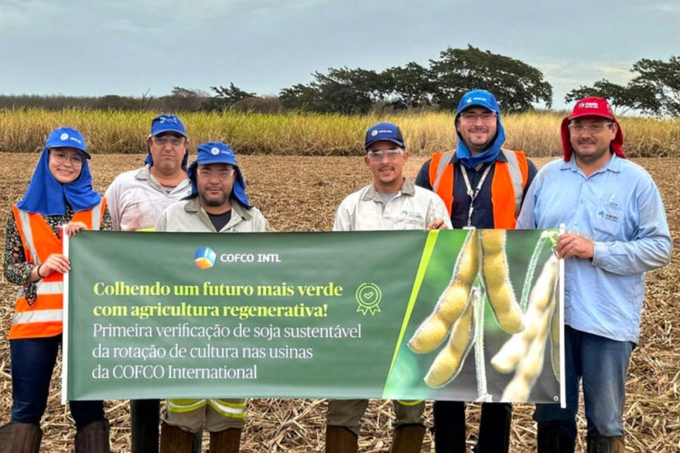December 2, 2025 | 15:13 GMT +7
December 2, 2025 | 15:13 GMT +7
Hotline: 0913.378.918
December 2, 2025 | 15:13 GMT +7
Hotline: 0913.378.918

The soybeans were produced as a rotational crop at COFCO International’s sugar plantations in São Paulo, Brazil.
The transaction builds on the first-ever agreement, shipped by COFCO in May, as part of the Green Value Chain Task Force initiated by the World Economic Forum’s Tropical Forest Alliance.
The soybeans were produced as a rotational crop at COFCO International’s sugar plantations in São Paulo, Brazil. Crop rotation is a regenerative agriculture practice that improves soil health, boosts yields, and reduces emissions by minimizing use of synthetic fertilizers.
Brazil is the world’s biggest soy producer, but the increased production is associated with deforestation and conversion of natural ecosystems, COFCO said. As a major exporter of Brazilian soy, COFCO International is taking steps to improve traceability, risk management and supplier performance.
In addition to being deforestation- and conversion-free with a Dec. 31, 2020, cut-off date, the soybeans passed third-party audits certifying they were produced in compliance with the COFCO International Responsible Agriculture Standard, which requires use of sustainable farming practices including water management, biodiversity conservation, and ethical labor standards.
The transaction follows a mass balance trade system. COFCO International also has completed pilot shipments of soy products from Brazil and Argentina in preparation for compliance with the European Union Deforestation Regulation (EUDR), which requires a segregated trade system.
COFCO International said it isdedicated to eliminating deforestationfrom its global soy, corn and palm supply chains by 2025.
(WG)

(VAN) The Institute of Agricultural Sciences for Southern Vietnam (IAS) marked its 100th anniversary in Ho Chi Minh City, celebrating a century of growth as a leading institute contributing significantly to Viet Nam’s agricultural development.

(VAN) An increasing number of livestock farms are using biogas generators to create a source of renewable electricity, helping to save costs and mitigate environmental pollution.

(VAN) Small changes in rice cultivation, from irrigation methods and straw collection to input management, are paving a new way for Vietnam's agriculture in the journey toward emission reduction.

(VAN) With the project of converting biogas into renewable electricity, Australia is both helping pig farms reduce their energy costs by up to 25% and contributing to environmental protection.
![Hue aims for Net Zero: [1] Initial steps from green transportation](https://t.ex-cdn.com/nongnghiepmoitruong.vn/608w/files/huytd/2025/11/28/0853-anh-6-giao-thong-xanh-hue-094717_940-153724.jpg)
(VAN) For sustainable development, Hue City is implementing many solutions to promote green transportation, which is an important initial step on the journey to building a Net Zero Hue.

(VAN) Nghe An Province, one of the localities with the largest forest area in Vietnam, is set to gain significant benefits from the implementation of forest carbon credit payments.

(VAN) Circular agriculture helps Mekong Delta farmers cut greenhouse gas emissions while boosting incomes through efficient reuse of agricultural by-products.